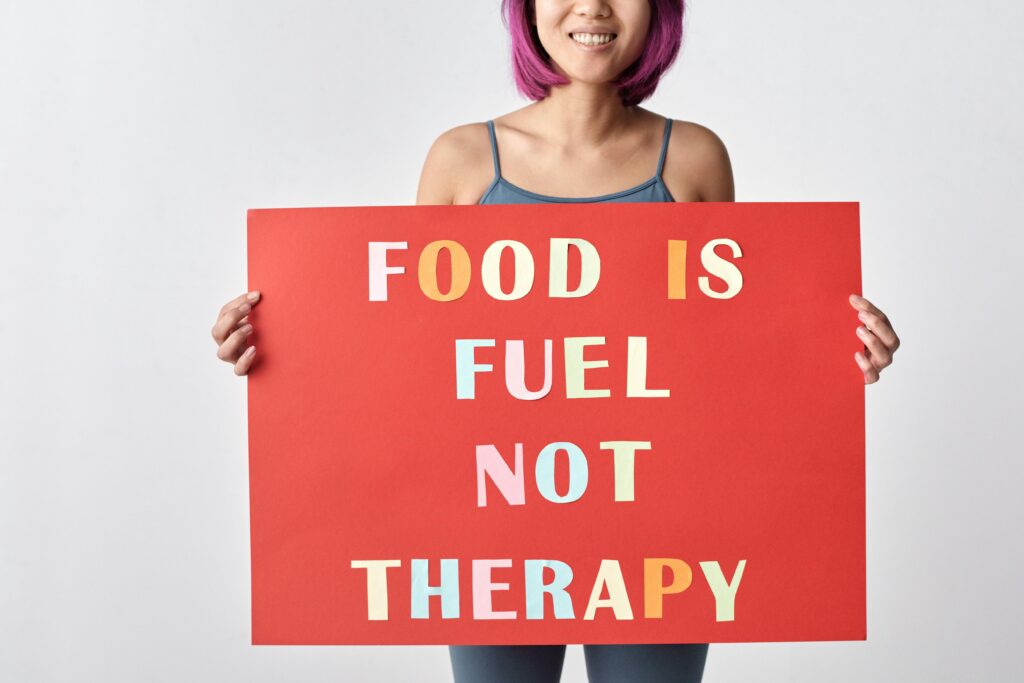Introduction
Sticking to a diet is hard when pizza ads scream your name. I used to cave every Friday night, trust me. But small tweaks rescued both my waistline and joy. Today I’ll show you the exact moves I made. We’ll explore smart swaps, snack hacks, and mindset resets. By the end, healthy eating will feel simple, not strict.
The shocking truth about why diet culture is destroying your soul isn’t just about failed weight loss attempts or yo-yo dieting. It’s about a system that has convinced millions of people that their worth depends on their body size, creating a toxic relationship with food that goes far deeper than what you see on the scale.
Diet culture has become so deeply embedded in our society that we barely notice its presence anymore. From the moment we wake up and check social media to see fitness influencers promoting their latest cleanse, to the conversations we have with friends about being “good” or “bad” with food, diet culture surrounds us. This pervasive system is quietly eating away at our mental health, self-esteem, and overall well-being in ways most people don’t even realize.
What is Diet Culture ?
Diet culture isn’t just about dieting – it’s a belief system that worships thinness and equates it with health and moral virtue. This system promotes weight loss as a means of achieving higher status, and it demonizes certain ways of eating while elevating others. Diet culture is the voice in your head that tells you you’re not disciplined enough when you eat a piece of cake, or that you need to “earn” your food through exercise.
The diet industry profits off our insecurities, creating a cycle where people feel they need to constantly restrict, control, and monitor their food intake to be worthy of love and acceptance. This multi-billion-dollar industry thrives on keeping people in a state of dissatisfaction with their bodies, always reaching for the next diet, supplement, or program that promises to finally give them the life they want.

The Hidden Messages of Diet Culture
Diet culture sends subtle but powerful messages every day:
- Your body is a problem to be solved
- Food is the enemy that must be controlled
- Your worth depends on your appearance
- Self-control around food equals moral superiority
- Being thin automatically means being healthy
These messages are so normalized that we often don’t question them. We accept that it’s normal to feel guilty about eating, to constantly think about food, or to judge ourselves and others based on body size.
The Mental Health Crisis Behind Diet Culture
The shocking truth about why diet culture is destroying your soul becomes clear when you look at its impact on mental health. Research shows that diet culture contributes to increased rates of anxiety, depression, and eating disorders. When people constantly restrict food and obsess over their weight, it creates a state of chronic stress that affects every aspect of their lives.
The mental load of diet culture is exhausting. People spend countless hours thinking about food, planning meals, counting calories, and worrying about their weight. This mental energy could be used for so many other meaningful pursuits – creativity, relationships, career goals, or simply enjoying life.
The Perfectionism Trap
Diet culture promotes an all-or-nothing mentality that feeds perfectionism. People feel they need to follow their diet perfectly, exercise the right amount, and maintain complete control over their eating. When they inevitably fall short of these impossible standards, they experience shame and self-criticism that can be devastating to their mental health.
This perfectionism extends beyond food and exercise. Diet culture teaches people that they need to perfect their bodies before they can live their lives fully. They postpone social events, romantic relationships, career opportunities, and personal goals until they reach their “goal weight” – often missing out on years of meaningful experiences.
How Diet Culture Destroys Self-Worth

One of the most damaging aspects of diet culture is how it ties self-worth to body size and food choices. When someone’s value as a person depends on what they eat or how much they weigh, it creates an unstable foundation for self-esteem that can crumble at any moment.
This conditional self-worth means that people’s mood and confidence fluctuate based on the number on the scale, what they ate that day, or how their clothes fit. They lose touch with their inherent worth as human beings, independent of their physical appearance.
The Comparison Game
Diet culture encourages constant comparison with others. Social media makes this even worse, as people compare their real bodies to filtered and edited images, or their normal eating patterns to the carefully curated meals of influencers. This comparison game is rigged – there’s always someone thinner, more disciplined, or more “successful” at dieting, leading to feelings of inadequacy and failure.
The truth is that bodies naturally come in different shapes and sizes, and what works for one person may not work for another. Genetic factors, medical conditions, medications, stress levels, and countless other variables affect body weight and shape. Diet culture ignores this reality and promotes the harmful myth that everyone can and should achieve the same idealized body type.
The Endless Cycle of Restriction and Shame
Diet culture creates a vicious cycle that keeps people trapped in patterns of restriction and shame. It starts with the promise that restricting food will lead to weight loss and happiness. When people inevitably break their food rules – because restriction is not sustainable long-term – they experience intense shame and guilt.
This shame leads to more restrictions as people try to “make up for” their perceived failures. They might skip meals, exercise excessively, or start an even more restrictive diet. This cycle of restriction and shame can continue for years or even decades, causing significant psychological damage.
The Biology of Restriction
What diet culture doesn’t tell you is that restriction triggers biological responses that make it nearly impossible to maintain long-term. When you restrict food, your body thinks it’s in a famine situation and responds by:
- Slowing down metabolism
- Increasing hunger hormones
- Decreasing satiety hormones
- Intensifying cravings, especially for high-calorie foods
- Reducing impulse control around food
These biological responses are normal and natural – they’re your body’s way of trying to keep you alive. But diet culture frames these responses as personal failures, leading to more shame and self-blame.
Physical Health Consequences of Diet Culture
While diet culture claims to promote health, it often has the opposite effect. The constant cycle of restriction and binge eating that characterizes diet culture can lead to numerous physical health problems:
- Metabolic damage: Repeated dieting can slow metabolism and make it harder to maintain a stable weight
- Nutrient deficiencies: Restrictive diets often eliminate entire food groups, leading to deficiencies
- Digestive issues: Stress and irregular eating patterns can cause digestive problems
- Sleep disruption: Hunger and food obsession can interfere with sleep quality
- Weakened immune system: Chronic stress from dieting can compromise immune function
The Weight Cycling Problem
Research shows that weight cycling (repeatedly losing and regaining weight) may be more harmful to health than maintaining a stable higher weight. Yet diet culture promotes this cycle by encouraging people to pursue weight loss even when previous attempts have failed.
Studies indicate that 95% of diets fail within five years, with most people regaining the weight they lost plus additional pounds. This isn’t because people lack willpower – it’s because the human body is designed to resist long-term calorie restriction.
Breaking Free from Diet Mentality
The shocking truth about why diet culture is destroying your soul also points to the path forward. Breaking free from diet mentality isn’t about finding a better diet or more willpower – it’s about completely changing your relationship with food and your body.
This process starts with recognizing diet culture messages and questioning them. When you hear that voice telling you to restrict food or criticizing your body, you can choose to respond differently. Instead of accepting these messages as truth, you can recognize them as products of a harmful system.
Steps to Break Free
- Identify diet culture messages: Notice when you’re thinking in terms of “good” and “bad” foods, or when you’re judging yourself based on eating choices
- Challenge food rules: Question why certain foods are “forbidden” and experiment with permitting yourself to eat all foods
- Practice self-compassion: Treat yourself with the same kindness you’d show a good friend
- Diversify your social media: Unfollow accounts that promote diet culture and follow body-positive, health-at-every-size advocates
- Seek support: Consider working with a therapist who specializes in eating disorders or body image issues
Building a Healthier Relationship with Food

Creating a healthy relationship with food means learning to trust your body’s natural hunger and fullness cues, eating for nourishment and pleasure, and removing the moral judgment from food choices. This approach, often called intuitive eating, allows you to respond to your body’s needs rather than following external rules.
Intuitive eating involves:
- Honoring your hunger
- Respecting your fullness
- Making peace with food
- Challenging the food police (diet culture voice in your head)
- Discovering satisfaction in eating
- Feeling your emotions without using food
- Respecting your body
- Moving your body in ways that feel good
- Practicing gentle nutrition
The Role of Gentle Nutrition
Gentle nutrition means making food choices that honor your health and taste preferences while being flexible and kind to yourself. It’s about adding nutrition to your life without subtracting joy or creating rigid rules. This approach recognizes that health is multifaceted and includes mental, emotional, and social well-being, not just physical health.
Creating Body Neutrality in Your Life
While body positivity encourages loving your body, body neutrality offers a middle ground that many people find more accessible. Body neutrality focuses on what your body can do rather than how it looks, and it doesn’t require you to love your appearance all the time.
Body neutrality practices include:
- Focusing on function over form
- Wearing clothes that fit your current body
- Limiting body checking behaviors
- Practicing gratitude for what your body does for you
- Engaging in activities you enjoy, regardless of your size
- Treating your body with respect and care
Finding Your Identity Beyond Your Body
Diet culture narrows our identity to our relationship with food and our body size. Recovery involves expanding your identity to include your values, interests, relationships, and contributions to the world. When you have a rich, full life that doesn’t revolve around your appearance, you’re less vulnerable to diet culture’s harmful messages.
Consider what truly matters to you – your relationships, creativity, career, hobbies, or causes you care about. These aspects of your identity are much more meaningful and lasting than your body size or what you ate for lunch.
Conclusion
The shocking truth about why diet culture is destroying your soul is that it’s designed to keep you small, not just physically, but emotionally and spiritually. It profits from your insecurities and keeps you distracted from living your fullest life. When you’re constantly worried about food and your body, you have less energy for the things that truly matter.
Breaking free from diet culture isn’t easy, especially in a society that reinforces these messages daily. But it’s one of the most important things you can do for your mental health, relationships, and overall well-being. You deserve to live a life free from food obsession and body shame.
Remember that healing from diet culture is a process, not a destination. Be patient with yourself as you unlearn years of harmful messages and develop a new relationship with food and your body. Your soul – and your life – will thank you for it.
Ready to start your journey away from diet culture? Begin by noticing one diet culture message you encounter today and questioning whether it’s true or helpful. Small steps can lead to profound changes in how you relate to food and yourself.
If you’d like more gentle inspiration delivered to your inbox, consider subscribing to The Zen Journal — a quiet space for thoughtful living.
